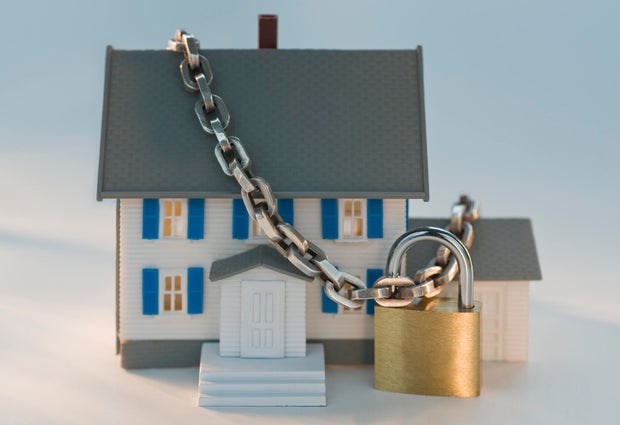 Locking in a mortgage rate could be a smart move right now, but only for some homeowners.
Daniel Grill/Getty Images
Locking in a mortgage rate could be a smart move right now, but only for some homeowners.
Daniel Grill/Getty Images
Mortgage rates have hovered close to 7% this summer, keeping many prospective homebuyers stuck in a holding pattern as they hope for home purchases to become more affordable. If you've been shopping for a home or considering a refinance, these high borrowing costs have likely given you sticker shock compared to rates from just a few years ago.
That said, hope may be on the horizon. The Federal Reserve's first rate cut of the year, which is expected to occur this fall, may provide some downward pressure on mortgage rates. However, concerns about inflation and labor market strength make it challenging to predict when or by how much rates might drop.
This uncertainty leaves borrowers with a tough choice: Is it wise to lock in a mortgage rate this September to secure today's terms, or is it smarter to wait for potentially better affordability ahead? Here's what lending professionals think.
Compare your mortgage loan options and lock in a top rate today.
Should you lock in a mortgage rate this September? Experts weigh in
Today's mortgage environment is in an unusual spot, one that's worth understanding before making your move.
Jim Breeze, senior vice president of mortgage product development at PNC Bank, suggests that current rates around 6.5% to 7% aren't extreme, but they feel that way to many borrowers. This is because "we're coming off historically low pandemic-era rates that many assumed would last," Breeze says. The disconnect between expectations and reality has made today's rates seem much higher than they are.
Given this context, "I'd lean toward locking in this September if you've found a rate that fits your budget," Steven Glick, director of mortgage sales at real estate investment fintech company HomeAbroad, says.
A rate lock freezes your interest rate for a set period, protecting you from increases while you complete your loan. You can always refinance later if things improve.
Still, the decision isn't a universal one. Below, experts break down when locking in a mortgage rate makes sense, and when waiting could pay off:
When locking in now makes sense
Certain situations make locking in a mortgage rate this month the clear choice, like:
- You're already in escrow. "If you've found a home and are under contract, locking protects you from market swings and ensures you can close without surprises," Debbie Calixto, sales manager at mortgage lender loanDepot, says.
- You're refinancing with a rate above 7%. According to Breeze, you'll likely benefit when you can lower your rate by at least 0.5%, especially if you're staying in the home long-term.
- You're self-employed or earn a variable income. Glick points out that market volatility hits these borrowers harder. "I've seen rates jump and disqualify folks mid-process," he says. "Secure what you qualify for today."
Find out how affordable the right mortgage loan could be now.
When waiting could pay off
If you have flexibility in timing, you don't have to lock in a mortgage rate now. In fact, waiting could be the smart move in these scenarios:
- You're casually house hunting. If you can wait until October, Glick advises holding off. "Markets are pricing in a September cut," he says. "And if it sparks a bigger drop, rates could dip below 6.5%."
- You're refinancing a rate already under 6%. "Borrowers with mortgage rates in the mid-6% or lower may not see enough monthly savings to justify refinancing in the near-term," Breeze says.
- You're improving an under-740 credit score. "If boosting your credit could qualify you for a better rate tier, waiting to lock may be worthwhile," Calixto says.
Expert strategies for navigating September's mortgage market
"The most successful borrowers are continuously improving their finances and understanding whether today's rates make sense for them," Breeze says.
Here are a few steps to help you do that:
- Know your strike rate. "Work with your lender to set a target rate where refinancing or buying makes sense, factoring in costs versus savings," Calixto says. You should also build flexibility into your budget in case rates move against you.
- Understand lock periods. Glick notes that locks typically last 30 to 60 days. "Go longer if your closing's delayed, but know extensions cost 0.125% to 0.25% of the loan amount," he says.
- Consider float-down options. Some lenders let you relock at a lower rate if rates drop during your lock period, usually for a fee. "It's worth it if you're risk-averse," says Glick.
- Look at the big picture. "Rates are [important], but so are home prices, your credit and market inventory," Glick says. "Build an emergency fund first — I've seen too many folks stretch thin chasing low rates."
The bottom line
Though mortgage interest rates could drop further later this year, sitting on the sidelines comes with no guarantees. Calixto warns that borrowers often wait for the "perfect" rate drop, then miss out on equity growth. So, focus on rates that work for your circumstances rather than try to time the absolute bottom.
"Preparation allows you to capture savings or lock in security when the window opens," Calixto says. And it doesn't have to be overwhelming, either. Start by contacting a home lender. They'll run your numbers and weigh your options with you. Most importantly, they can plan for different scenarios so you're ready to move swiftly when the right opportunity comes.
Sharon Wu, a senior writer with over a decade of experience, specializes in consumer-focused content covering home and finance topics such as insurance, investments, credit, debt, mortgages and home security.


















































